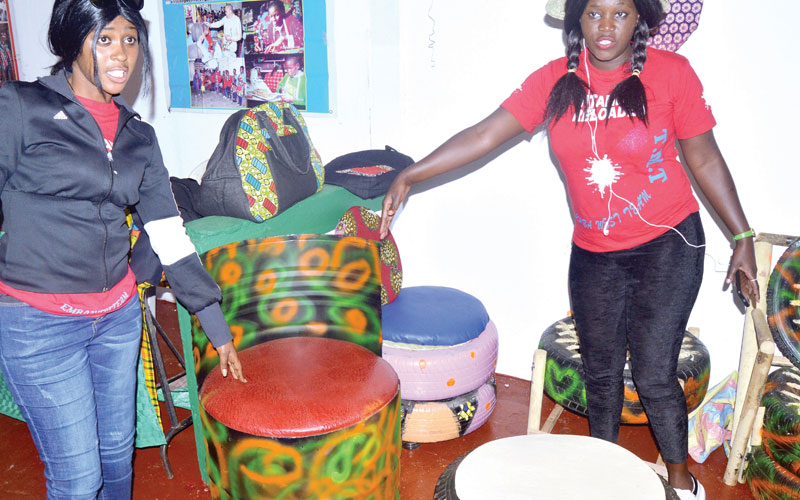The tyre mamas
By Milliam Murigi, November 5, 2019To reduce the environmental impact of burning and dumping rubber tyres, a group of women came together to recycle them into household items
Nairobi is expected to have 1.35 million vehicles by 2030. The number is expected to be even more going by the current rate of registration.
The National Transport and Service Authority (NTSA) registers 7,000 vehicles monthly and 90,000 every year.
As the number of vehicles on our roads continues to rise, the problem of scrap tyre disposal presents serious waste management challenges for society. This is because an average motor vehicle will go through several sets of tyres in its lifetime.
In this regard, a group of 15 young women, all under 35, have come together to set up a business to turn discarded rubber tyres into thoughtful home furniture and other artefacts.
Beautiful tyre planters invited me to Jitambue Reloaded group’s stand during the Nairobi International Trade Fair. I couldn’t keep my eyes off those ankara-decorated pieces.
For this group of women from Mowlem, Nairobi county, recycling tires is a venture they embarked on this year. Initially, it run a garbage collection and bakery business, but the increase of waste tyres made them venture into recycling.
Lessons from Internet
“At first the number of tyres was not that much, but they kept increasing every day. From our side, we used to burn them because we didn’t know what to do with them.
However, after we started recycling them, we are even going out of our way to get them,” says Mariam Yakub, the group assistant secretary.
Since none of them has been trained on making the products, they meet every day to brainstorm and come up with the best design. So far, they have been relying on the Internet, from where they get tutorials. They combine their sense of creativity with an affinity for the environment.
“Finding creative ways to give old tyres a second life is an important conservation effort. We would like to urge Kenyans to stop burning tyres, especially since most people think the best way to dispose of scrap tyres is to burn them or throw them in dump sites. This, unfortunately, creates an environmental strain,” says Mariam.
It is estimated that in Kenya, about 34,000 tonnes of waste tyres have been burnt haphazardly, dumped, destroyed or re-used by methods that pollute the air, soils, and groundwater since 2010.
The group is up recycling tyres sourced from garages, incinerators, and individuals, as well as those dumped by the roadside.
Once collected, these tyres are scrubbed free of grit and oil, followed by a rinse. These clean tyres are subsequently drilled in preparation for the final furnishings.
From there, the entrepreneurs create “artsy and ultra-modern” chairs, tables, stools, planters, flower pots, akala shoes among others, which happen to be sustainable and earth-friendly.
However, Mariam says it hasn’t been an easy journey for them because they get a lot of negative energy from their friends and community, but this hasn’t killed their dream and vision.
Free training
“Our dream is to inspire as many women as possible. We want to let women know that one doesn’t need to rely on a white-collar job, but you can create your job. Always look for opportunities and be your boss,” she says.
The group doesn’t have a specific target clientele. Their product rangers from Sh10,000 to Sh25,000 for furniture; and Sh2,000 for flower vases made from liquor bottles.
What are some of the advantages of using such furniture? She says they are durable, comfortable and affordable, and can be used both indoors and outdoors.
She reveals that the future looks bright because furniture companies are reaching for sustainability goals by using recycled materials and making their products more recyclable. Also, people are becoming more eco-conscious with whatever they are buying.
For the competition, the group believes there is a market for every piece. Because of this, they are willing to train as many women as possible for free.
And to ensure that they remain relevant in the industry the groups rely hugely on research. To them, research has helped them come up with trendier items that are giving their venture a business sense.
“It is only a matter of creativity. We add a touch of ankara to our products and this makes them a little bit different from the locally available tire furniture,” says Mariam.
She reveals that the group doesn’t rely wholly on old tires, but they also recycle other wastes such as drums also to make furniture, though on a small-scale basis.
They are not limited to the number of products they can make because the raw material is readily available. One only needs to make an order and the rest will fall in place.
